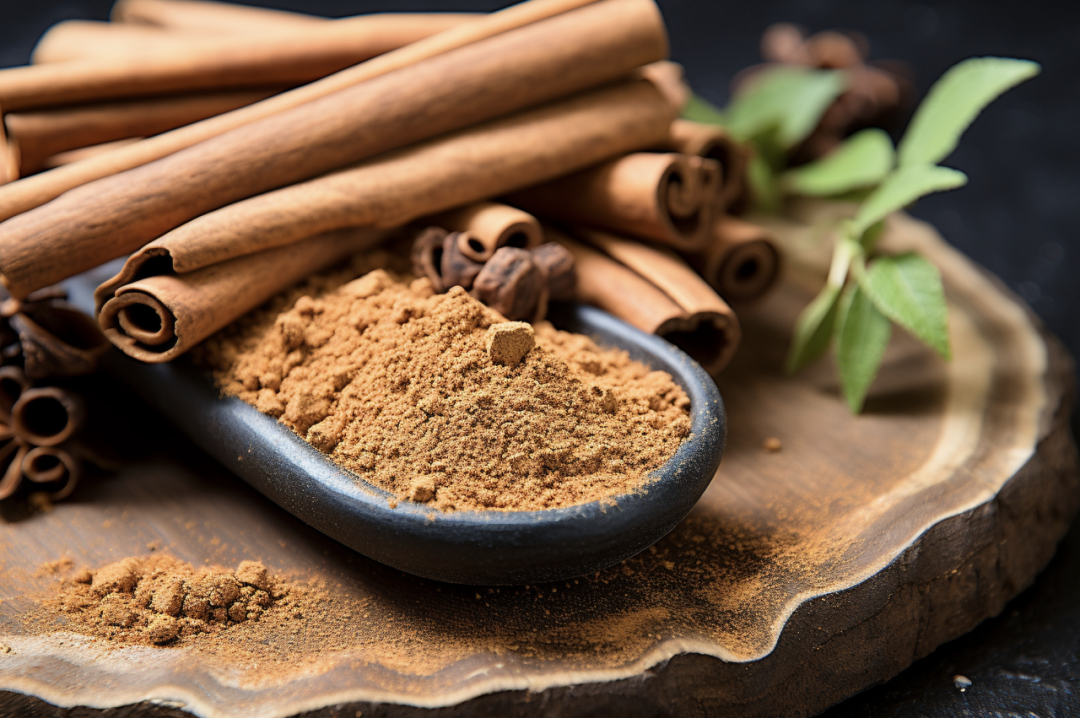Cinnamon
肉桂
As winter approaches, cinnamon bread, apple cinnamon tea, and mulled wine become popular, with cinnamon frequently appearing, bringing a delightful and warm feeling. However, it is not just about adding a unique flavor; its health benefits are worth mentioning!

Cinnamon — A Natural Dietary Ingredient
The cinnamon we commonly see is actually the bark of the cinnamon tree, dried and rolled into quills, and it can also be ground into powder. Cinnamon has been used in traditional medicine around the world for thousands of years. In China, it is more commonly used as a spice in savory dishes, but it is increasingly being applied in desserts and beverages.
Nutritional Components of Cinnamon
Cinnamon is typically consumed in small amounts, so it does not play a significant role in overall daily nutrition. For example, a teaspoon of cinnamon powder (about 3g) contains 7 kcal of energy, 0.1g of protein, 2g of carbohydrates, 1.5g of dietary fiber, 25mg of calcium, and 10mg of potassium.
However, it is rich in various antioxidant components!
Cinnamon contains a special phytochemical — cinnamaldehyde, which is found in cinnamon oil, gives it its aroma, and is a powerful anti-inflammatory component. Most of the health benefits of cinnamon can be attributed to this special compound. Cinnamon also contains other bioactive compounds, such as catechins and proanthocyanidins, which also have antioxidant and anti-inflammatory effects.

Health Benefits of Cinnamon
01 | Anti-inflammatory and Antioxidant
The antioxidant components abundant in cinnamon help eliminate free radicals in the body, reducing cellular damage and providing anti-inflammatory effects. This is important for promoting overall health, as chronic inflammation is closely related to many chronic diseases. Cinnamon can even act as a preservative in some food preparations.
02 | Antibacterial and Antiviral
Cinnamon possesses many medicinal soothing properties and is commonly used in traditional Chinese medicine. Cinnamaldehyde has been shown to prevent bacterial and fungal infections and has antiviral effects, including against influenza.
03 | Prevention and Relief of Diabetes
Cinnamon has been found to help lower fasting and postprandial blood sugar levels and improve insulin resistance. Studies have shown that consuming a small amount of cinnamon daily can improve fasting blood sugar and glucose tolerance in prediabetic patients and lower hemoglobin A1c levels in diabetic patients.
However, if you are taking hypoglycemic medications, you should be cautious with cinnamon consumption to avoid hypoglycemia.
04 | Blood Pressure and Lipid Reduction, Maintaining Cardiovascular Health
Regular consumption of cinnamon helps to stabilize blood pressure and regulate blood lipids, thus maintaining cardiovascular health. Studies have found that taking cinnamon supplements can significantly reduce weight, abdominal fat, total cholesterol, triglycerides, low-density lipoprotein cholesterol, and blood pressure, all of which protect the heart.
05 | Maintaining Brain Health
As we age, brain diseases like Alzheimer’s become more common, usually caused by the gradual degeneration of brain cells, with abnormal protein fragments accumulating in the brain, slowing thinking and memory abilities.
The phytochemicals in cinnamon seem to inhibit the accumulation of these abnormal proteins, helping to prevent or alleviate Alzheimer’s disease.
06 | Promoting Gut Health
Cinnamon has prebiotic properties that help maintain gut microbiota balance, support digestive system health, and alleviate digestive issues.
Side Effects of Incorrect Cinnamon Consumption
There are two common types of cinnamon, among which cassia cinnamon contains more of a chemical called coumarin, which can damage the liver. Most of the time, small amounts of cassia cinnamon do not cause any issues, but consuming large amounts may pose problems, especially for those sensitive to this compound, such as individuals with liver disease. Therefore, Ceylon cinnamon is recommended, as it contains significantly less coumarin and is less likely to cause harm.
Although cinnamon is beneficial, consuming it in large doses can also have side effects! For example, it may interfere with the effects of certain medications, cause gastrointestinal disturbances, or allergic reactions.

How to Consume Cinnamon?
Cinnamon is a very versatile ingredient, and most supermarkets carry cooking cinnamon quills, while many online stores offer Ceylon cinnamon powder.
Cinnamon quills are often used in stews, sauces, or marinades, and can also be brewed in black tea or mulled wine. Cinnamon powder is more convenient for use, commonly added to baking, coffee, desserts, and beverages for flavoring.

Information Sources
https://www.bbcgoodfood.com/howto/guide/health-benefits-cinnamon
https://www.verywellhealth.com/cinnamon-7505730
https://www.webmd.com/diet/supplement-guide-cinnamon


